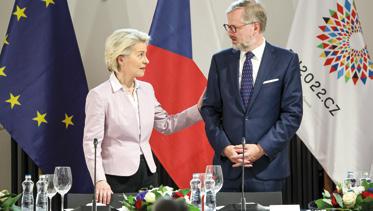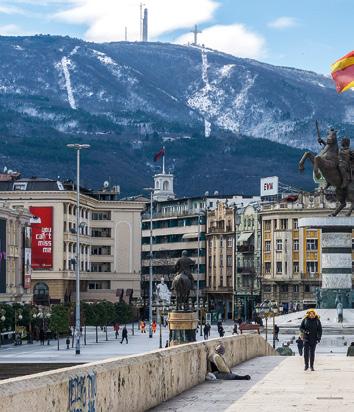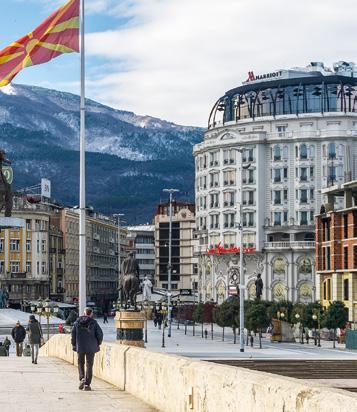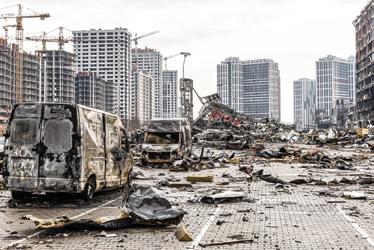
6 minute read
Editorial, Hartmut Bühl
The Germans and the war
Russia’s attack on Ukraine has undoubtedly strengthened the very foundations of the European Union (EU) and the North Atlantic Treaty Organisation (NATO). Solidarity has become a guide to action since 24th February 2022. Special attention was quickly focused on Germany after a historic speech by the German Chancellor, Olaf Scholz, on 28th February, in which he announced a turning point in relations between the west and Russia, which found great resonance. But rapidly, Germany’s reluctance to deliver heavy weapons to Ukraine, contradicting previous legislation to deliver weapons to crisis areas, came in for criticism. Germany had shown itself willing to provide financial aid to Ukraine, but most partners in the EU and NATO had little understanding of the Germans’ reluctance to support Ukraine with tanks and artillery and accused Berlin of being selfish and lacking in solidarity. Germany was also accused of not wanting to alienate Russia as an economic partner after the war. The Chancellor’s fear that the war could spill over to Germany and western Europe was received with scepticism. The European and American press quickly made the point that 75 years after the end of the Second World War, Germany could no longer hide behind Nazi crimes for its own benefit. The image of the ugly German came to the fore once again; willing to work hard and single-mindedly to create wealth but unwilling to take on responsibility for others. And that was only the start of it! These comments fail to recognise that the Germans cannot, and do not wish to, forget their history, so great were the crimes that Germany committed under Hitler. The anticipatory obedience of an entire people was not to be repeated, and western Germany’s European partners were very happy to have a docile neighbour for so long. The slogan “Make peace, not war” of the Peace Movement in the 1980s became widely accepted in a Germany turned towards pacifism and was probably one of the factors that led to the neglect of its armed forces after the country’s reunification. And then, just four days after Putin’s invasion of Ukraine, Olaf Scholz announced that he intends to spend €100bn to restore the badly neglected Bundeswehr. Received with astonishment by its partners, some dismissed it as the usual German rhetoric. Others saw it as a bluff and were sure that the proposals would not pass Parliament, the “protector” of Germany’s armed forces. Parliament decides on all essentials concerning the Bundeswehr in peacetime. This parliamentary oversight anchors the German armed forces at the heart of society. The representatives of the people therefore bear a great deal of responsibility, including for the equipment of forces. Unfortunately, it cannot be claimed that Parliament has discharged this duty in recent years and properly tackled the task of keeping the Bundeswehr operational and well-armed. On the contrary, the German political class has failed across the board. There was therefore widespread astonishment when the German Bundestag took only two months to react to the Chancellor’s proposal to rearm the Bundeswehr by changing the Constitution. Meanwhile, Germany has been delivering heavy weapons to Ukraine with the support of a majority of its population and the green light of the Bundestag. Putin’s war has wrought fundamental change – change that has had a far-reaching effect on the west but especially on Germany. The “peace dividend” has been buried once and for all and the conviction that the country must be able to defend itself has prevailed. Germany has shown that even a “parliamentary army”, that only knows the Federal Chancellor as commander-in-chief in the event of a crisis or a war, is able to take important decisions to defend peace and freedom together with its allies. Within the west, the roles are being redistributed. The USA has re-established its claim to leadership in NATO. It remains to be seen whether this is just a one-off or a permanent development. But politically, it is for sure a turning point for Germany: for the first time, German politicians seem ready to take over leadership in some fields of European defence matters!
Hartmut Bühl
photo: private, LISphoto.com
IMPRESSUM: The European − Security and Defence Union
Headquarters: International Consulting 6, Rue du Château, F 28260 Berchères-sur-Vesgre (FR) E-Mail: hartmut.buehl@orange.fr Publisher and Editor in Chief: Hartmut Bühl, Berchères-sur-Vesgre (FR) Phone: +49/172 32 82 319 E-Mail: hartmut.buehl@orange.fr Deputy Editor-in-Chief: Nannette Cazaubon, Paris (FR) E-Mail: nannette.cazaubon@magazine-the-european.com Editorial Assistant: Céline Angelov, Linz a. Rhein (GE) E-Mail: editorial.assistant.esdu@gmail.com Translator: Miriam Newman-Tancredi, Strasbourg (FR) and London (GB) Layout: Beate Dach, SpreeService, Berlin (GE) Advertisement & Sales: Hartmut Bühl, Berchères-sur-Vesgre (FR) Phone: +49/172 32 82 319 Print: Polyprint GmbH (GE) © 2022 by International Consulting, France
THE EUROPEAN – SECURITY AND DEFENCE UNION
Vol. No. 43
Content
3 Editorial, Hartmut Bühl 6 News, Nannette Cazaubon
8–16 In the Spotlight

“Europe as a Task: Rethink, Rebuild, Repower”
8 Has the time for EU power come? The EU’s role regarding the war in Ukraine by Dr Delphine Deschaux-Dutard, Grenoble and
Bastien Nivet, Paris La Défense
10 “Brain dead” in 2019, NATO has revived in 2022
Commentary by Hartmut Bühl
11 European sovereignty Europeans will not weigh in isolation by Cyrille Schott, Strasbourg
12 European security and the management of simultaneous crises The Union must live up to its aspirations by Gesine Weber, Paris
14 Strategic leadership in the European Union Preparing future military leaders by Hartmut Bühl, Paris
17–28 MAIN TOPIC: The European Union and its neighbours
Is the EU neighbourhood and enlargement policy truly human and fair?
18 European enlargement, security and defence on the rise The EU must become a stronger security provider by David McAllister MEP, Brussels/Strasbourg
21 There must be coherence between enlargement and Schengen policy Guest commentary by Prof Ioan Mircea Pașcu, Bucharest
22 How to help the EU’s eastern neighbours solve major challenges in peace and security Speed up progress and modernisation by Teresa Czerwińska, Luxembourg


24 How to realise EU enlargement with the Balkans and Ukraine The way forward
Interview with Gerald Knaus, Berlin
27 The Union Civil Protection Mechanism The capacity to respond to CBRN threats by Dr Antonella Cavallo, Brussels
The European – Security and Defence Union is the winner of the 2011 European Award for Citizenship, Security and Defence, and was awarded in 2019 the Jury’s Special Prize of the same competition.
29–48 Security and defence
Putin’s war and its implications for Europe
30 Putin’s war of aggression and its implications for European security and defence We can no longer afford national reflexes by Michael Gahler MEP, Brussels/Strasbourg
32 All that glitters is not gold Conference report on French-German relations by Hartmut Bühl, Paris
34 30 years of EUROCORPS A force for the EU and NATO
Interview with Lt Gen Peter Devogelaere, Strasbourg
38 Creating strength by joint higher military education How to forge a common spirit
Interview with Ilmar Tamm, Tartu
40 How to successfully prosecute CBRN crimes – from the crime scene to the courtroom EU-funded CBRN guidance handbooks by Talgat Toleubayev
42 China’s counter measures against US Theatre Missile Defence Strategic challenges in the Indo-Pacific region by Debalina Ghoshal, Kolkata
44 Security steels for Europe Increasing demand for forces protection by Jörg Maffert, Dillingen
46 For a credible and efficient defence of Europe by Patrice Mompeyssin, Paris










